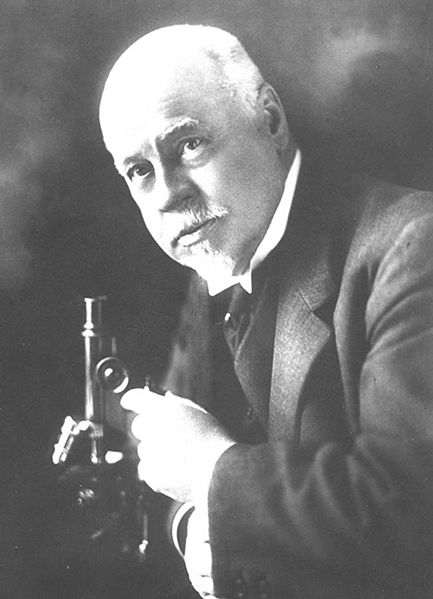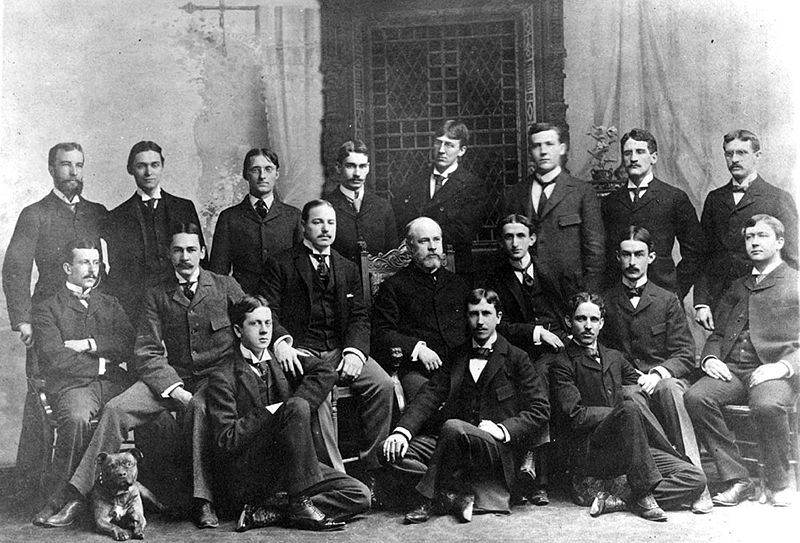<Back to Index>
- Physician William Henry Welch, 1850
- Painter Lodewijk de Vadder, 1605
- Amir of the Timurid Empire Timur (Tamerlane), 1336
PAGE SPONSOR


William Henry Welch, M.D. (April 8, 1850 - April 30, 1934) was an American physician, pathologist, and medical school administrator. He was one of the "Big Four" founding professors at Johns Hopkins Hospital. (The "Big Four" were William Osler, Professor of Medicine; William Stewart Halsted, Professor of Surgery; Howard A. Kelly, Professor of Gynecology; and William H. Welch, Professor of Pathology.) He was the first dean of the Johns Hopkins University School of Medicine and was also the founder of the Johns Hopkins School of Hygiene and Public Health, the first school of public health in the country. The medical school library is named after Welch. In his lifetime he was referred to as "the Dean of American Medicine".
Born in Norfolk, Connecticut, Welch was educated at Norfolk Academy and the Winchester Institute. He entered Yale University in 1866, where he studied Greek and classics. He received an A.B. degree in 1870. As an undergraduate, he joined the Skull and Bones fraternity.
After a short period of teaching Greek at Yale as a junior faculty member, Welch went to study medicine at the Columbia University College of Physicians and Surgeons, in Manhattan. After obtaining his M.D. in 1875, he did extensive postgraduate study in Europe. In 1884, he was the first physician recruited to be a professor at the newly forming Johns Hopkins Hospital and Medical School at Johns Hopkins University in Baltimore. By 1886 he had sixteen graduate physicians working in his laboratory - the first postgraduate training program for physicians in the country. He helped the trustees recruit the other founding physicians for the hospital - William Stewart Halsted, William Osler, and Howard Kelly. Welch became head of the Department of Pathology when the hospital opened in 1889. In 1894, he also became the first dean of the Johns Hopkins University School of Medicine, and in 1916, he established and led the Johns Hopkins School of Hygiene and Public Health, the first school of public health in the country. He also established the Institute of the History of Medicine at Johns Hopkins in 1929.
Welch continued to practice and teach pathology. He was a popular teacher. Indeed, his nickname among medical students and postgraduate trainees was, "Popsy." Graduates of his training programs were highly coveted as academic physicians. Medical schools and institutes across the country vied for Welch's former students and graduate scientists to fill top posts. Many of his residents went on to become highly prominent physicians, including Walter Reed, co-discoverer of the cause of yellow fever, and Simon Flexner, founding director of the Rockefeller Institute for Medical Research.
Welch's research was principally in bacteriology, and he is the discoverer of the organism that causes gas gangrene. It was named Clostridium welchii in recognition of that fact, but now the organism usually is designated as Clostridium perfringens. From 1901 to 1933 he was founding president of the Board of Scientific Directors at the Rockefeller Institute for Medical Research. He was an instrumental reformer of medical education in the United States as well as a president of the National Academy of Sciences from 1913 - 1917. He also was president of the American Medical Association in addition to other prestigious associations. He was a founding editor of the Journal of Experimental Medicine. A the age of eighty - four, Welch died on April 30, 1934 of prostatic adenocarcinoma at Johns Hopkins Hospital.
The William H. Welch Medical Library at Johns Hopkins, which opened in 1929, is named for him. Welch Road, in the vicinity of Stanford University Medical Center in Stanford, California, is named in his honor.